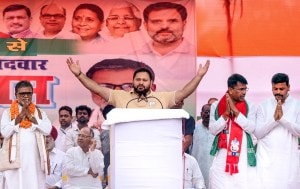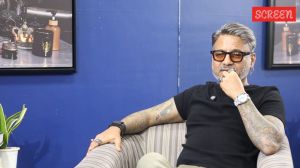Dhaka warmth on ULFA leads to chill with New Delhi
India's already tense relationship with Bangladesh has hit a new low with Dhaka formally criticising comments made by outgoing Indian High C...

India’s already tense relationship with Bangladesh has hit a new low with Dhaka formally criticising comments made by outgoing Indian High Commissioner M.L. Tripathi about Bangladesh’s alleged protection of wanted ULFA leader Anup Chetia, at a farewell dinner hosted by the Opposition Awami League party chief Sheikh Hasina some three weeks ago.
New Delhi has rejected the charge.
Earlier this week, the Foreign Office in Dhaka summoned Indian Acting High Commissioner Dilip Sinha to protest against Tripathi’s rather frank analysis of the India-Bangladesh relationship at the Awami League dinner on October 24.
At the dinner, Tripathi had protested remarks by Bangladeshi Parliamentary Affairs Advisor Salahuddin Quader Chaudhury about Chetia being ‘‘a greater freedom fighter’’ than Mujibur Rahman. This, Tripathi had said, ‘‘amounted to politically endorsing a secessionist movement in a part of (India). This has caused serious concern in India’’.
So when Dhaka sought to hand over an ‘aide-memoire’, a diplomatic form of indictment criticising Tripathi’s comments, Sinha refused to accept it. Sinha pointed out to his interlocutors that in the week after his October 24 speech and before he finally left for Delhi, Tripathi had met the seniormost leadership in Bangladesh, including Prime Minister Khaleda Zia and President Iajuddin Ahmed, as well as Foreign Secretary Shamsher Mobin Chowdhury. None of them, however, had even indirectly taken up Tripathi’s remarks with him.
After refusing to accept the protest note, Sinha left the Foreign Office. By the time he reached the Indian High Commission, some 30 minutes away by car, he was told that the Dhaka Foreign Office had faxed a ‘note verbale’ (a rather more severe form of diplomatic protest) in his name. Sinha found that the ‘aide-memoire’ he had refused to accept half an hour ago had now been converted into written communication.
At the October 24 speech, Tripathi had castigated the continuing ‘‘encouragement and support to insurgent groups’’ by Dhaka in India’s North-East, as well as the fact that hardcore wanted ULFA insurgents like Chetia and Sanjit Deb Burman continued to live in Bangladesh.
While Burman continued to operate from Bangladesh though he had not formally been given asylum, Tripathi had said, Chetia is given first-class treatment in the Dhaka prison where he has been lodged since 1997 for violating Bangladesh’s laws. ‘‘He is even provided a cellphone to keep in touch with like-minded criminals in India,’’ Tripathi had added.
He had then gone on to refer to Chowdhury’s remarks about Chetia during the Budget debate in Parliament in summer.
But Tripathi hasn’t been the only one to take offence over Chowdhury’s Chetia remarks. External Affairs Minister Yashwant Sinha had taken up the matter with Prime Minister Khaleda Zia when he had gone to Dhaka in July for the Joint Economic Commission meetings.
Sinha’s barely disguised unhappiness over the Chetia remarks was there for all to see, observers said, and he had barely finished making his remarks when Khaleda had replied, somewhat brusquely: ‘‘But your Advani also makes statements.’’
An uncomfortable silence had fallen upon the meeting, observers added, and Sinha could hardly bring himself to respond to the felt impropriety.
Just before this he had raised the fact that a trade and transit agreement had been signed between the two countries as early as 1972 (under Mujib), reiterated in 1980 (under Zia-ur Rahman, Khaleda’s husband), but still not been implemented, and perhaps both foreign offices, along with technical experts, could now quickly conclude this. In response, Khaleda Zia had murmured ‘‘it may be possible’’ to do this.
But after the uncomfortable Chowdhury-Chetia exchange, when Sinha had sought to return to the transit issue, the Bangladeshi PM had been short and to the point. ‘‘Aamra eta korte parbo na (We won’t be able to do this),’’ she had replied in Bengali.
Analysts pointed out that when Khaleda Zia’s BNP had defeated Sheikh Hasina’s Awami League two years ago, none other than PM Vajpayee had sent two personal congratulatory messages to Khaleda. He had even sent Principal Secretary Brajesh Mishra as his personal envoy to meet her within the month.
But the relationship deteriorated, with New Delhi believing that Dhaka would rather play to a domestic audience (‘‘We stood up to Delhi’’) than resolve serious issues like insurgency in the North-East, that spilled over into Bangladesh, illegal immigration, trade and transit.
Still, in keeping with his good neighbourly approach, especially with smaller nations, Vajpayee had been ready to visit Dhaka—and never mind the protocol. For Khaleda Zia had been insisting that since she had come to Delhi in 1992 (notwithstanding the fact that Vajpayee as PM had gone in mid-1999 to inaugurate the Dhaka-Kolkata bus), she would not come to Delhi before Vajpayee visited Dhaka. Just for half a day, Bangladeshi ministers had requested.
A half-day prime ministerial visit was thus on the cards en route to Vajpayee’s trip to South-East Asia. But after the Sinha-Khaleda incident in July, it was taken off the itinerary. There was no way New Delhi was now going to agree.







- 01
- 02
- 03
- 04
- 05
























